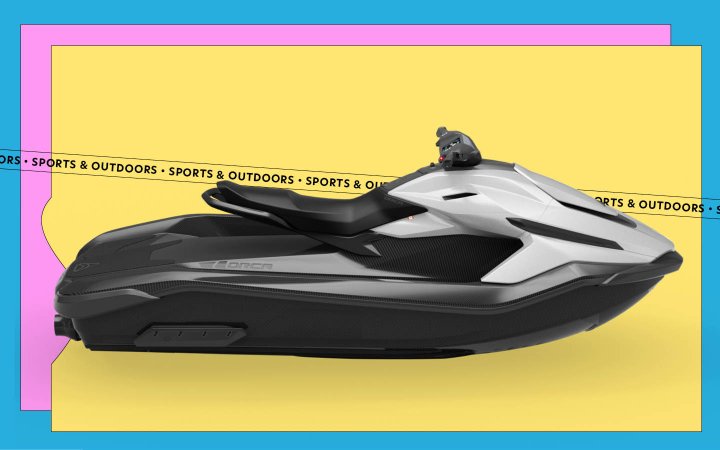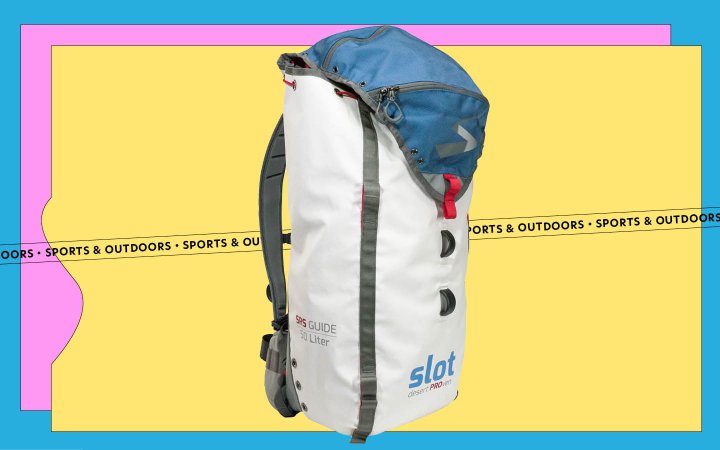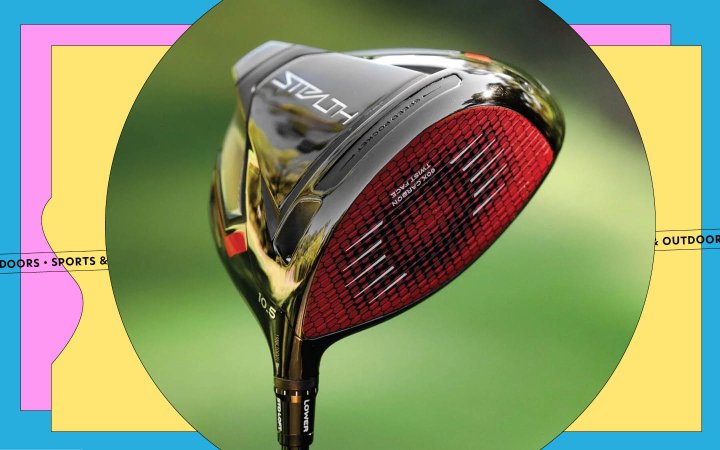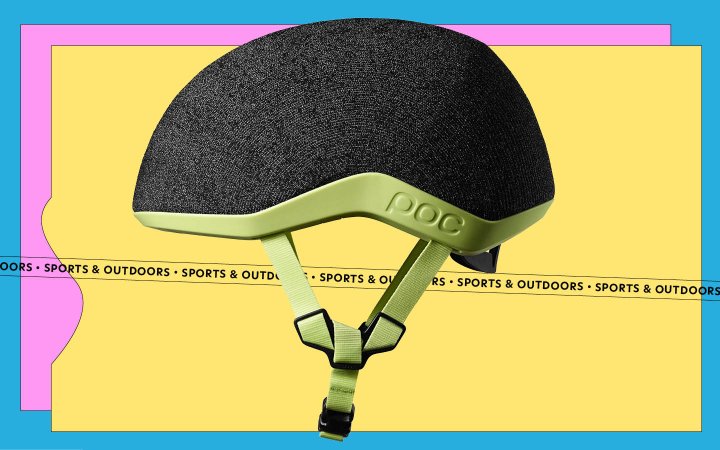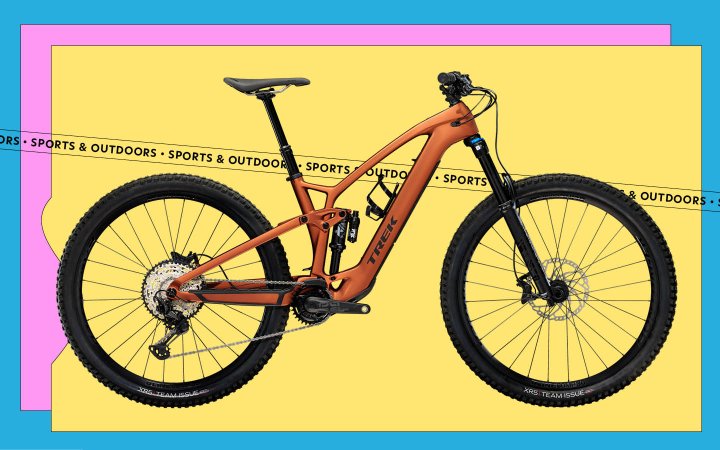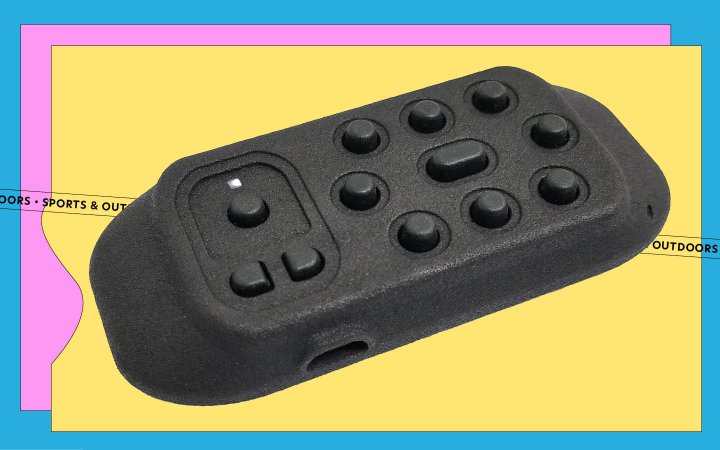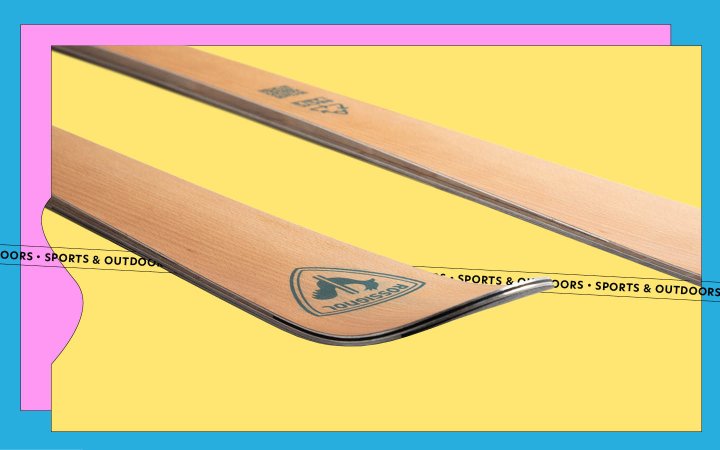

We may earn revenue from the products available on this page and participate in affiliate programs. Learn more ›
This year’s sports and outdoor innovations make our adrenaline-filled adventures smarter, while going easier on the Earth. On land, a bike helmet can be broken down and recycled at the end of its life. In the snow, a ski that helps you tear down the mountain can also be similarly repurposed. But the best sports and outdoor tech this year helps us communicate better—whether that be a new system for catchers to relay plays to pitchers, or a satellite safety beacon that keeps you connected to family and friends. One winner represents both: an electric joy ride that makes careening through the water easy, fun, and carbon-neutral.
Looking for the complete list of 100 winners? Check it out here.
Grand Award Winner
Orca Carbon by Taiga: A silent, safer emission-free joy ride
Personal watercraft like Jet Skis are fun to ride, but this year’s winner makes them greener. Historically, personal watercrafts—or PWCs—operate on fossil fuel, emit noise up to 115 decibels, and leak unburned gasoline into the water. Enter the Taiga Orca Carbon, which takes electric vehicles aquatic. (The company built upon what it learned from its line of electric snowmobiles). This PWC replaces the gas tank with lithium-ion batteries, which power the jet-drive impeller, creating an electric vessel that is silent and emission-free. The powertrain is located in the bottom of the hull for better handling and performance, which creates a safer ride. The Taiga Orca Carbon broadens the accessibility of on-water exploration, and shows that ditching the engine doesn’t have to decrease the fun.
Canyon Packs by Slot: Gear designed for desert rappelling
Adventurers who go canyoneering squeeze through narrow sandstone passages, sometimes while walking in or swimming through a river, and nearly always must also manage technical gear like ropes and belay devices. Slot’s Guide 50L and Rapide 38L canyoneering packs are specifically designed with these desert conditions in mind, with an innovative rope management system. A divider separates rope from gear and allows users to feed out only the amount of line they need—from 15 to 200 feet—for each rappel. The bag keeps the rest of the rope organized inside, along with the rest of your equipment. The result is a more efficient and safer system that eliminates the need to uncoil and recoil rope for each rappel.
Stealth driver by TaylorMade: A club that’s one tough cookie
Drivers suffer the most damage compared to other golf clubs, experiencing 30,000 Gs of force in one swing. Carbon fiber—a lightweight, strong material—usually cracks under that amount of power, which led clubmakers to use flexible titanium faces for their drivers. But TaylorMade changes the golf club game with its new StealthDriver, finding a way to use carbon after all. Its light face can handle plenty of strokes, higher ball speeds, and longer drives, thanks to its 60 layers of carbon, reduced weight, and aerodynamic shape. Despite the changes, it still gives off the satisfying thwack golfers love from a club with an all-metal head.
Piston Pro X by Kuat: An easy-loading and safe bike rack
Bike racks are notoriously difficult and annoying to load. Most require two hands, which makes securing a bicycle while holding the rack open almost impossible if you’re flying solo. But Kuat’s Piston Pro features smooth-opening, hydro-pneumatic arms that you can operate with just one hand and let you fasten a bike by the tires without touching the frame. The company also incorporates brake lights into the bike rack. The sleek, eye-catching piece of gear holds ebikes too; a separate ramp for electric bikes assists with loading. And a 12mm lock keeps everything secure.
Myelin Helmet by POC Sports: A lid that’s recyclable
Bike helmets are typically in service for five to 10 years, then they head for the landfill. But the POC Myelin helmet gets a new life when its time protecting a rider’s head is over. The headpiece may look like a regular cycling helmet at first, but inside its clean design hides a host of advanced technical details, such as adhesive-free assembly, a recycled fabric outer shell, and cutaway fasteners. These allow the helmet to be separated into individual pieces at the end of its life for easy recycling in your home’s blue bin, or at your local recycling center.
Fuel EXe by Trek Bikes: An electric mountain bike with a no-engine feel
Typical ebikes deliver a whiny hum and noticeable surge when you pedal with the assist they offer. Other riders can find the noise obnoxious, too. But the Trek Fuel EXe is the best new “SL,” or superlight ebike, blurring the line between purely human-powered and pedal-assist bikes. Trek partnered with German robotics manufacturer TQ to develop the new HPR50 motor, which forgoes noisy belts and gears in favor of a refined system; it’s smaller, quieter, and more durable than traditional ebike motors. The result is a sleek, powerful ride with a smooth boost that’s hard to distinguish from your own pedaling power.
ePE Membrane by GORE-TEX: A new type of waterproof tech from an old-school company
Gore, the company that invented the waterproof but breathable GORE-TEX membrane in 1968, is back with a new material that aims to take planet-polluting chemicals out of outerwear. After more than seven years of development and rigorous testing, Gore built upon its experience with expanded polytetrafluoroethylene (ePTFE), polymer processing, and materials science to create an expanded polyethylene (ePE) membrane that’s thin, light, and strong. The new material is also free of environmentally damaging perfluorochemicals (PFCs) and made with recycled nylon and polyester, resulting in a reduced carbon footprint. You can find the new ePE membrane—which has set a new standard in waterproofing—in GORE-TEX products like the Patagonia Storm Shift jacket and pants.
PitchCom by PitchCom Sports: A 150-year baseball problem, solved
Signs in baseball vary from team to team and player to player: Catchers flash two fingers so the pitcher knows to hurl a fastball; coaches use signs to tell a baserunner if they should bat or bunt. However, the opposing team can read these signs and use them to their own advantage, making sign-stealing a 150-year-old problem. Now PitchCom Sports—which created a wrist transmitter for catchers and a receiver for inside the pitcher’s hat—has relieved professional players of the threat of intercepted signals. Phrases like “fastball” and “good job!” are pre-loaded as .mp3 files onto the PitchCom device and played when the catcher or coach presses the button. Only the people wearing the PitchCom receiver can hear the play. And, the commands can be played in any language, so all players on the team know the play.
Salem Dyneema Down Parka by Foehn: A puffy jacket that doesn’t wear down
Down jackets are known for their warmth—and their short life span. Sportswear company Foehn solves inevitable wear and tear by incorporating Dyneema, an incredibly strong synthetic fiber previously used in backpacks and other outdoor gear. The tough new garment combines high-performance insulation with the practically indestructible Dyneema to create a jacket that won’t rip while out on tundra escapades or be slashed by a dog’s untrimmed nails. It’s a lifetime investment for outdoor enthusiasts and those just looking for a tough, stylish, warm piece of kit.
inReach Messenger by Garmin: A gadget for staying always connected
Satellite communicators can be expensive, tricky to connect to a signal when you need it, and are typically used for extreme outdoor adventures or emergencies only. (Or they require the newest iPhone, as we highlight in our Emergency Services and Defense category.) The Garmin inReach Messenger is designed for more everyday pursuits: when entering a deadzone during a road trip or staying connected while hiking far from cell towers. This 4-ounce personal safety device lets you text anyone from anywhere over satellite, through pairing it to your phone and with the Garmin Messenger app, by using its virtual keyboard, or utilizing preset messages on the device itself. In case of emergency, the inReach Messenger connects the user to the Garmin Response center. And should your phone die, the inReach Messenger’s Safety Charging gives your phone a partial charge for continued use.
Essential Ski by Rossignol: Reducing waste, one set of skis at a time
The Essential Ski is a first—and a feat—for Rossignol: It’s made from 62 percent recycled, certified natural, and bio-sourced materials, including aluminum, steel, and wood. The design process uses no solvents or water. Plus, the ski can be recycled through a partnership with MTB Recycling that will repurpose the ski’s materials to the automotive, garden, or construction industries. And it’s produced using renewable energy. But don’t let its Earth-friendliness fool you: It’s a real-deal ski that lives up to Rossignol’s performance and durability standards. Plus, they’re not even guarding the secret of how they made it, so that others can make greener skis, too.
